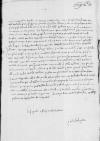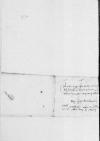List #3830
Isabel DELGADA do Ioannes DANTISCUSValladolid, 1529-12-31
| odebrano Mantua, [1530, April or May] 3 Rękopiśmienne podstawy źródłowe:
Pomocnicze podstawy źródłowe:
Publikacje:
| ||||||||||||
Tekst + aparat krytyczny + komentarz Zwykły tekst Tekst + komentarz Tekst + aparat krytyczny
Al muy Magnifico Señor
De porte quatro reales
Digo quatro reales ... illegible⌈...... illegible⌉
Muy Magnífico Señor:
En treinta de deziembre 1529 resçebí una letra de V(uest)ra
Señoría y una su figura q(ue) me dio el señor
Los hijos suyos están muy buenos y Juanica no ay dotor q(ue) más sepa q(ue) ella y está la más parlera y graçiosa de todo el mundo. Suplico a V(uest)ra Señoría se ynforme de los t(iem)pos q(ue) verá an pasado de tanta fatiga, espeçialmente de pan, y se acuerde dellos y de mí, como syempre lo a hecho, y lo haze.
Los doze ducados q(ue) me ymbió rresçebí, q(ue) me los ymbió el señor
Nuevas algunas de acá, yo no las sé, porq(ue) no salgo de mi casa. Lo q(ue) me ymbya a mandar por sus c(art)as, yo tengo mucho cuydado dello, y tendré mientras Diós me diera vida, y desto tenga V(uest)ra Señoría perdido el cuydado, porq(ue) más me va a mí en ello q(ue) a V(uest)ra Señoría. Yo fuy a besar las manos del señor
Encomiéndome a toda la familia.
De
La q(ue) queda a s(er)viçio de V(uest)ra Señoría


 UUB, H.155, f. 153v
UUB, H.155, f. 153v